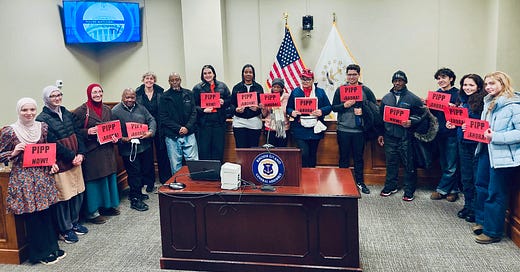Other states protect lower-income customers from high utility costs. Why doesn't Rhode Island?
“In recent years, there have been multiple, dramatic utility rate increases which increase dangerous utility shut-offs..."
High utility costs hit low-income and medically vulnerable Rhode Islanders hard. Utility shut-offs are costly and dangerous, especially for people whose wellbeing is dependent on ventilators or other powered medical devices. The plans and policies offered by Rhode Island Energy, the largest electric utility in the State, are largely inadequate and leave many low-income and medically vulnerable utility customers in dire straits. Rhode Island remains one of the most expensive states in terms of energy costs.
For years, the George Wiley Center (GWC), a statewide energy justice and anti-poverty organization, has advocated adopting a Percentage of Income Payment Plan (PIPP) at the Rhode Island General Assembly. More recently, the GWC has also advocated for legislation that increases utility protections for medically vulnerable people.
“In recent years, there have been multiple, dramatic utility rate increases which increase dangerous utility shut-offs,” said Daisy Paz, an organizer with the George Wiley Center. “The George Wiley Center is encouraging the timely passage of bills that are sound solutions to the impacts of inflation and utility company price gouging while improving protections for medically vulnerable utility consumers.”
On Tuesday, two national utility policy experts joined the GWC at the Rhode Island State House to provide their perspectives on legislative proposals focused on increasing protections for medically vulnerable people and improving utility programs to lower utility costs. Representative David Morales emceed the event.
Charlie Harak1 is the senior attorney at the National Consumer Law Center (NCLC), and Elizabeth Marx2 is the Executive Director at the Pennsylvania Utility Law Project (PULP). Rhode Island Energy’s parent company, PPL, is based in Pennsylvania. These policy experts have extensive backgrounds in comparative utility analysis and were able to provide a comparative study of the George Wiley Center’s two key legislative utility policy proposals:
House Bill 5245 creates an income-sensitive tiered subsidy program to ensure affordable home energy utility costs for eligible low-income households.
House Bill 5068 extends the forbearance of utility terminations for customers with serious illness certifications. It would amend various provisions related to the termination of utility services for persons who are disabled, seriously ill, or in arrears.
Here’s the video of the press conference:
Why should you support PIPP?
PIPP (Percentage Income Payment Plan) ensures that utility rates are affordable for low-income households, helps alleviate the shut-off crisis in Rhode Island, and reduces eligible households’ energy burden to an affordable percentage of income.
Affordability and credits to consumers’ utility bills are determined using tiers based on income level and type of energy use, with affordable energy burden ranging from 3% to 6% of a household’s gross annual income. According to the United States Department of Energy, the percentage of income customers pay for energy should ideally be under 6%. Currently, the average rate of income paid in Rhode Island is 16%, nearly triple what is considered a good utility policy. Thousands of Rhode Island households experience the trauma of utility termination each year due to unaffordable bills. This housing and energy burden crisis demands leadership from Rhode Island officials.
Under a PIPP, low-income households pay a fixed percentage of their income for utility bills. This percentage depends on the Federal Poverty Level. In order to have a fair utility rate structure, those with the lowest income should not pay the highest percentage of their income for utility bills. Right now, Rhode Islanders living under the Federal Poverty line routinely spend higher percentages of their income on utilities compared to higher-income households. A PIPP plan would allow people with the lowest incomes to pay a more manageable amount for their utilities and help stop the shut-off crisis in Rhode Island.
PIPP has worked in Rhode Island before and has worked in other states.
In the late 1980s, Rhode Island was one of the first states in the country to implement a PIPP. Over a dozen states, such as Ohio, New Jersey, New Hampshire, and Maine, have successful PIPP programs. In Illinois, for example, a PIPP lowered 90% of elderly customers’ heating bills—more than any other utility assistance plan did. The current legislative proposal is modeled on PIPPs in states like New Hampshire and New Jersey. PIPP works in Pennsylvania, where Rhode Island Energy’s parent company, PPL, is located.
Legislation protecting the medically vulnerable from utility shut-off work in our neighboring states
The bill protecting medically vulnerable utility customers would allow medical professionals to determine the length of utility protections based on medical conditions. By adopting the exact language already in use in Connecticut, New Hampshire, and Massachusetts, vulnerable Rhode Islanders with medical conditions would gain the same level of utility protections as other states in New England.
The press conference above was prefaced with a poem by Keville Kouraj:
Charlie Harak has been the senior attorney at the National Consumer Law Center (NCLC) for 24 years, specializing in energy and utilities issues. He represents consumers before regulatory agencies, testifies at legislative hearings, and provides legal and policy counsel to low-income advocates, legal services lawyers, and government officials. He also devotes much of his time to training lawyers, advocates, and front-line social services staff regarding the rights of utility customers. Much of his work focuses on energy efficiency issues, including federal appliance efficiency standards, climate change, and advocacy for larger, smarter energy efficiency investments in affordable multifamily housing. Charlie currently serves as a commissioner of the Board of the Melrose Housing Authority and is a member of the Equity Working Group of the Massachusetts Energy Efficiency Advisory Council. Before joining NCLC, Charlie was an assistant attorney general in Massachusetts, working in the utilities and insurance division. For 16 years, he also worked at the Massachusetts Law Reform Institute.
Charlie Harak co-authorized with Olivia Wein, Protecting seriously ill consumers from utility disconnections what states can do to save lives now
Elizabeth Marx has been Executive Director for over five years and was the Supervising Attorney of the Pennsylvania Utility Law Project (PULP) for over a decade. Elizabeth has worked to advance energy and utility justice through litigation, targeted policy advocacy, training, consultation, and the creation of support services.
She was responsible for leading PULP’s statewide litigation of energy and water cases on behalf of low-income Pennsylvanians. She also assisted with the creation and launch of PULP’s statewide utility assistance hotline, which now assists hundreds of Pennsylvanians in avoiding termination or reconnecting to service each year.
She is committed to achieving PULP’s mission to ensure that all low-income Pennsylvanians can access and maintain safe and affordable utility services at home. She has a substantial background in family, utility, and housing law.
Elizabeth serves as Chairperson of the Low Income Home Energy Assistance Program Advisory Council and the Department of Community and Economic Development’s Weatherization Assistance Program Policy Advisory Council. She is also a member of the Public Utility Commission’s Consumer Advisory Council and the Department of Environmental Protection’s Climate Change Advisory Council.






Thanks Steve, this is a critical issue for many in our state, already burdened by very high rents and living costs. I encourage your readers to check out the George Wiley Center's website -- they do really great work in this and many other areas -- thank you Camilo, Daisy, and others at the GWC!
a complicated issue. Part of the reason electric rates go up in the winter is the price of natural gas, used for both heating and power generation, becomes more valuable, made worse by our support for the war in Ukraine and the sanctions on Russia - so some natural gas is also used to supply Europe as an alternative to Russia. That said, I think the electric price this winter is actually a bit less than last year which was a bit less than the year before. Look it up. But it is a good issue for politicians because nobody likes paying